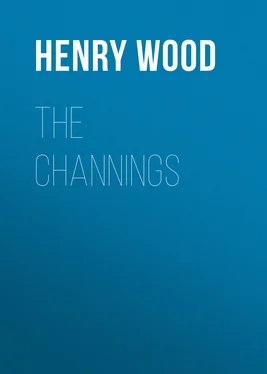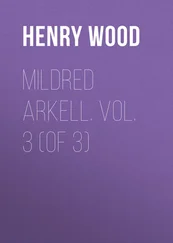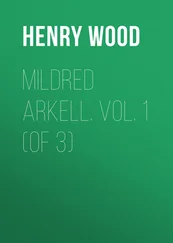Henry Wood - The Channings
Здесь есть возможность читать онлайн «Henry Wood - The Channings» — ознакомительный отрывок электронной книги совершенно бесплатно, а после прочтения отрывка купить полную версию. В некоторых случаях можно слушать аудио, скачать через торрент в формате fb2 и присутствует краткое содержание. Жанр: foreign_sf, literature_19, на английском языке. Описание произведения, (предисловие) а так же отзывы посетителей доступны на портале библиотеки ЛибКат.
- Название:The Channings
- Автор:
- Жанр:
- Год:неизвестен
- ISBN:нет данных
- Рейтинг книги:4 / 5. Голосов: 1
-
Избранное:Добавить в избранное
- Отзывы:
-
Ваша оценка:
- 80
- 1
- 2
- 3
- 4
- 5
The Channings: краткое содержание, описание и аннотация
Предлагаем к чтению аннотацию, описание, краткое содержание или предисловие (зависит от того, что написал сам автор книги «The Channings»). Если вы не нашли необходимую информацию о книге — напишите в комментариях, мы постараемся отыскать её.
The Channings — читать онлайн ознакомительный отрывок
Ниже представлен текст книги, разбитый по страницам. Система сохранения места последней прочитанной страницы, позволяет с удобством читать онлайн бесплатно книгу «The Channings», без необходимости каждый раз заново искать на чём Вы остановились. Поставьте закладку, и сможете в любой момент перейти на страницу, на которой закончили чтение.
Интервал:
Закладка:
Mrs. Henry Wood
The Channings: A Story
CHAPTER I. – THE INKED SURPLICE
The sweet bells of Helstonleigh Cathedral were ringing out in the summer’s afternoon. Groups of people lined the streets, in greater number than the ordinary business of the day would have brought forth; some pacing with idle steps, some halting to talk with one another, some looking in silence towards a certain point, as far as the eye could reach; all waiting in expectation.
It was the first day of Helstonleigh Assizes; that is, the day on which the courts of law began their sittings. Generally speaking, the commission was opened at Helstonleigh on a Saturday; but for some convenience in the arrangements of the circuit, it was fixed this time for Wednesday; and when those cathedral bells burst forth, they gave signal that the judges had arrived and were entering the sheriff’s carriage, which had gone out to meet them.
A fine sight, carrying in it much of majesty, was the procession, as it passed through the streets with its slow and stately steps; and although Helstonleigh saw it twice a year, it looked at it with gratified eyes still, and made the day into a sort of holiday. The trumpeters rode first, blowing the proud note of advance, and the long line of well-mounted javelin men came next, two abreast; their attire that of the livery of the high sheriff’s family, and their javelins held in rest. Sundry officials followed, and the governor of the county gaol sat in an open carriage, his long white wand raised in the air. Then appeared the handsome, closed equipage of the sheriff, its four horses, caparisoned with silver, pawing the ground, for they chafed at the slow pace to which they were restrained. In it, in their scarlet robes and flowing wigs, carrying awe to many a young spectator, sat the judges. The high sheriff sat opposite to them, his chaplain by his side, in his gown and bands. A crowd of gentlemen, friends of the sheriff, followed on horseback; and a mob of ragamuffins brought up the rear.
To the assize courts the procession took its way, and there the short business of opening the commission was gone through, when the judges re-entered the carriage to proceed to the cathedral, having been joined by the mayor and corporation. The sweet bells of Helstonleigh were still ringing out, not to welcome the judges to the city now, but as an invitation to them to come and worship God. Within the grand entrance of the cathedral, waiting to receive the judges, stood the Dean of Helstonleigh, two or three of the chapter, two of the minor canons, and the king’s scholars and choristers, all in their white robes. The bells ceased; the fine organ pealed out—and there are few finer organs in England than that of Helstonleigh—the vergers with their silver maces, and the decrepit old bedesmen in their black gowns, led the way to the choir, the long scarlet trains of the judges held up behind: and places were found for all.
The Rev. John Pye began the service; it was his week for chanting. He was one of the senior minor canons, and head-master of the college school. At the desk opposite to him sat the Rev. William Yorke, a young man who had only just gained his minor canonry.
The service went on smoothly until the commencement of the anthem. In one sense it went on smoothly to the end, for no person present, not even the judges themselves, could see that anything was wrong. Mr. Pye was what was called “chanter” to the cathedral, which meant that it was he who had the privilege of selecting the music for the chants and other portions of the service, when the dean did not do so himself. The anthem he had put up for this occasion was a very good one, taken from the Psalms of David. It commenced with a treble solo; it was, moreover, an especial favourite of Mr. Pye’s; and he complacently disposed himself to listen.
But no sooner was the symphony over, no sooner had the first notes of the chorister sounded on Mr. Pye’s ear, than his face slightly flushed, and he lifted his head with a sharp, quick gesture. That was not the voice which ought to have sung this fine anthem; that was a cracked, passée voice, belonging to the senior chorister, a young gentleman of seventeen, who was going out of the choir at Michaelmas. He had done good service for the choir in his day, but his voice was breaking now; and the last time he had attempted a solo, the bishop (who interfered most rarely with the executive of the cathedral; and, indeed, it was not his province to do so) had spoken himself to Mr. Pye on the conclusion of the service, and said the boy ought not to be allowed to sing alone again.
Mr. Pye bent his head forward to catch a glimpse of the choristers, five of whom sat on his side of the choir, the decani ; five on the opposite, or cantori side. So far as he could see, the boy, Stephen Bywater, who ought to have taken the anthem, was not in his place. There appeared to be only four of them; but the senior boy with his clean, starched surplice, partially hid those below him. Mr. Pye wondered where his eyes could have been, not to have noticed the boy’s absence when they had all been gathered round the entrance, waiting for the judges.
Had Mr. Pye’s attention not been fully engrossed with his book, as the service had gone on, he might have seen the boy opposite to him; for there sat Bywater, before the bench of king’s scholars, and right in front of Mr. Pye. Mr. Pye’s glance fell upon him now, and he could scarcely believe it. He rubbed his eyes, and looked, and rubbed again. Bywater there! and without his surplice! braving, as it were, the head-master! What could he possibly mean by this act of insubordination? Why was he not in his place in the school? Why was he mixing with the congregation? But Mr. Pye could as yet obtain no solution to the mystery.
The anthem came to an end; the dean had bent his brow at the solo, but it did no good; and, the prayers over, the sheriff’s chaplain ascended to the pulpit to preach the sermon. He selected his text from St. John’s Gospel: “That which is born of the flesh is flesh, and that which is born of the Spirit is spirit.” In the course of his sermon he pointed out that the unhappy prisoners in the gaol, awaiting the summons to answer before an earthly tribunal for the evil deeds they had committed, had been led into their present miserable condition by the seductions of the flesh. They had fallen into sin, he went on, by the indulgence of their passions; they had placed no restraint upon their animal appetites and guilty pleasures; they had sunk gradually into crime, and had now to meet the penalty of the law. But did no blame, he asked, attach to those who had remained indifferent to their downward course; who had never stretched forth a friendly hand to rescue them from destruction; who had made no effort to teach and guide in the ways of truth and righteousness these outcasts of society? Were we, he demanded, at liberty to ignore our responsibility by asking in the words of earth’s first criminal, “Am I my brother’s keeper?” No; it was at once our duty and our privilege to engage in the noble work of man’s reformation—to raise the fallen—to seek out the lost, and to restore the outcast; and this, he argued, could only be accomplished by a widely-disseminated knowledge of God’s truth, by patient, self-denying labour in God’s work, and by a devout dependence on God’s Holy Spirit.
At the conclusion of the service the head-master proceeded to the vestry, where the minor canons, choristers, and lay-clerks kept their surplices. Not the dean and chapter; they robed in the chapter-house: and the king’s scholars put on their surplices in the schoolroom. The choristers followed Mr. Pye to the vestry, Bywater entering with them. The boys grouped themselves together: they were expecting—to use their own expression—a row.
Читать дальшеИнтервал:
Закладка:
Похожие книги на «The Channings»
Представляем Вашему вниманию похожие книги на «The Channings» списком для выбора. Мы отобрали схожую по названию и смыслу литературу в надежде предоставить читателям больше вариантов отыскать новые, интересные, ещё непрочитанные произведения.
Обсуждение, отзывы о книге «The Channings» и просто собственные мнения читателей. Оставьте ваши комментарии, напишите, что Вы думаете о произведении, его смысле или главных героях. Укажите что конкретно понравилось, а что нет, и почему Вы так считаете.












